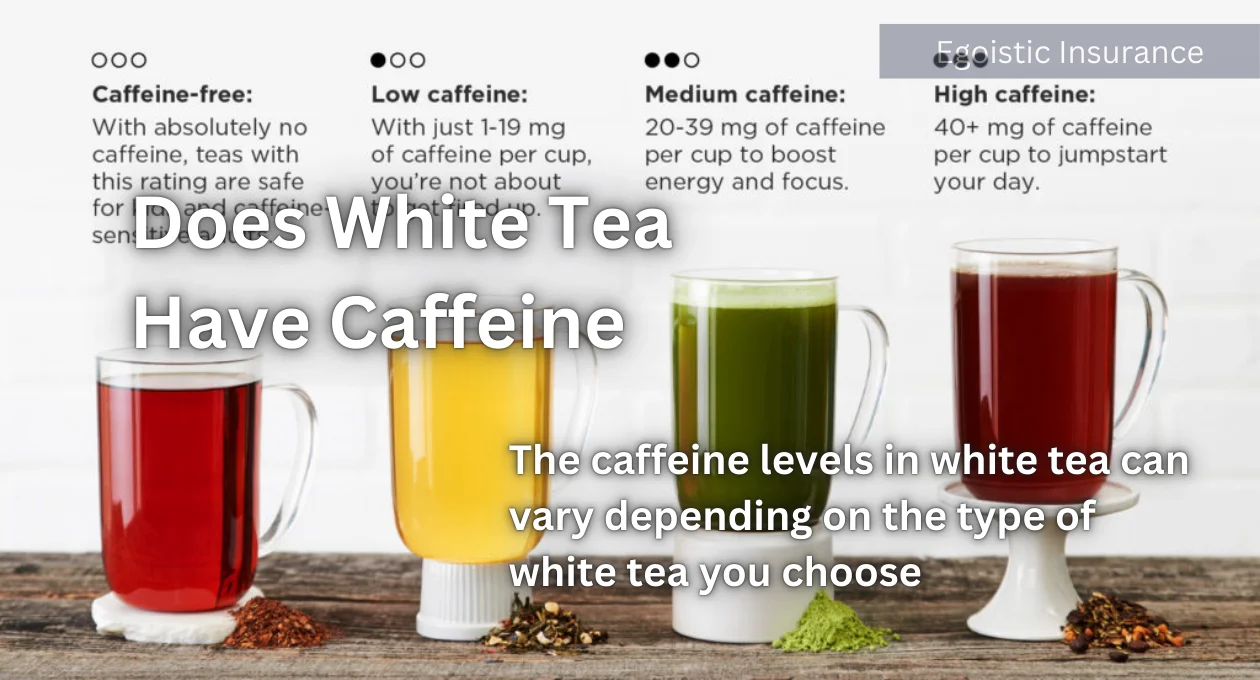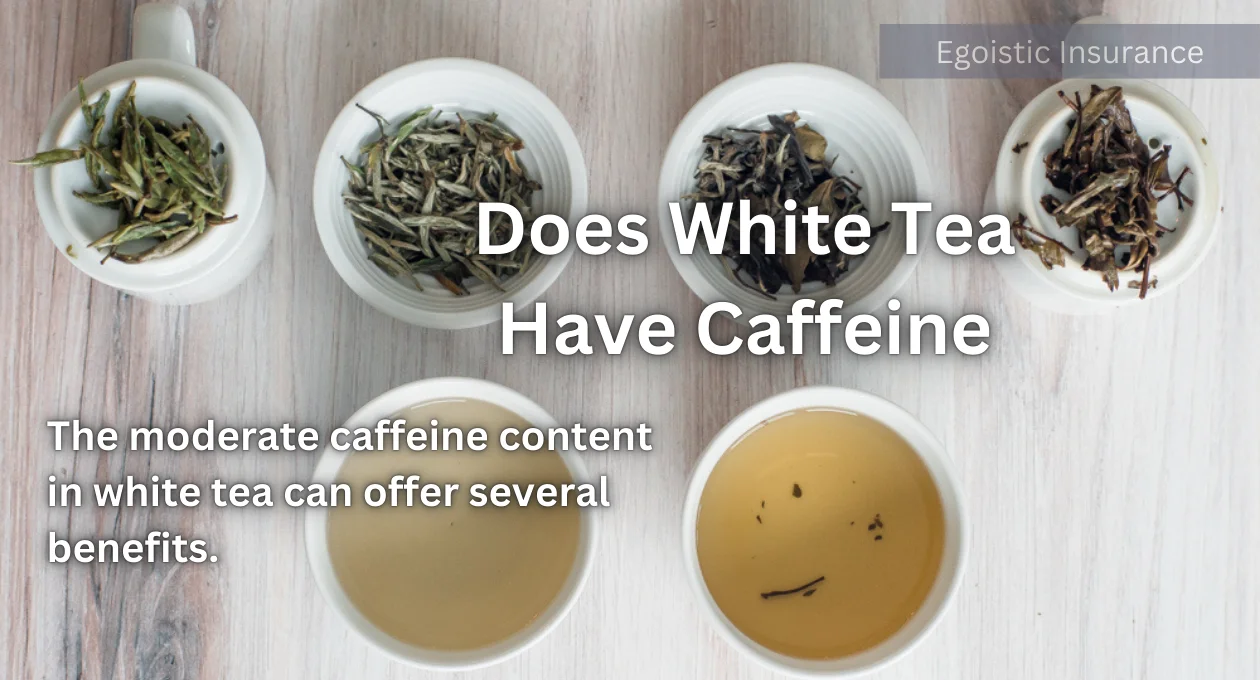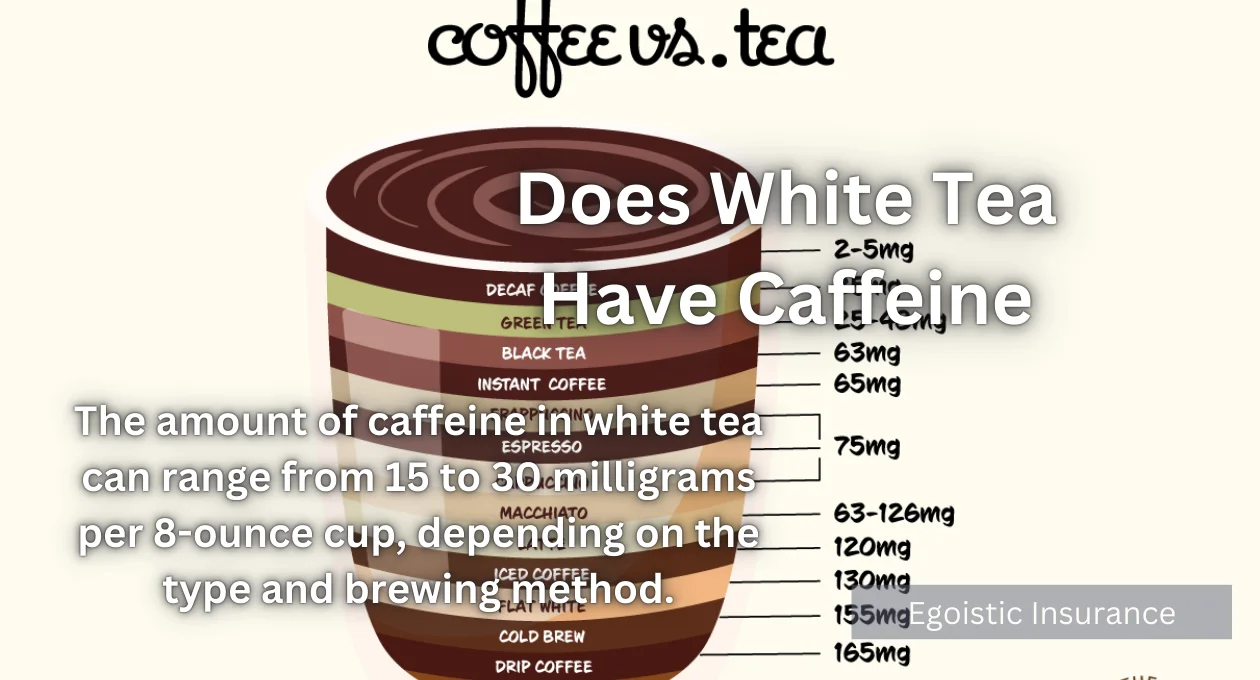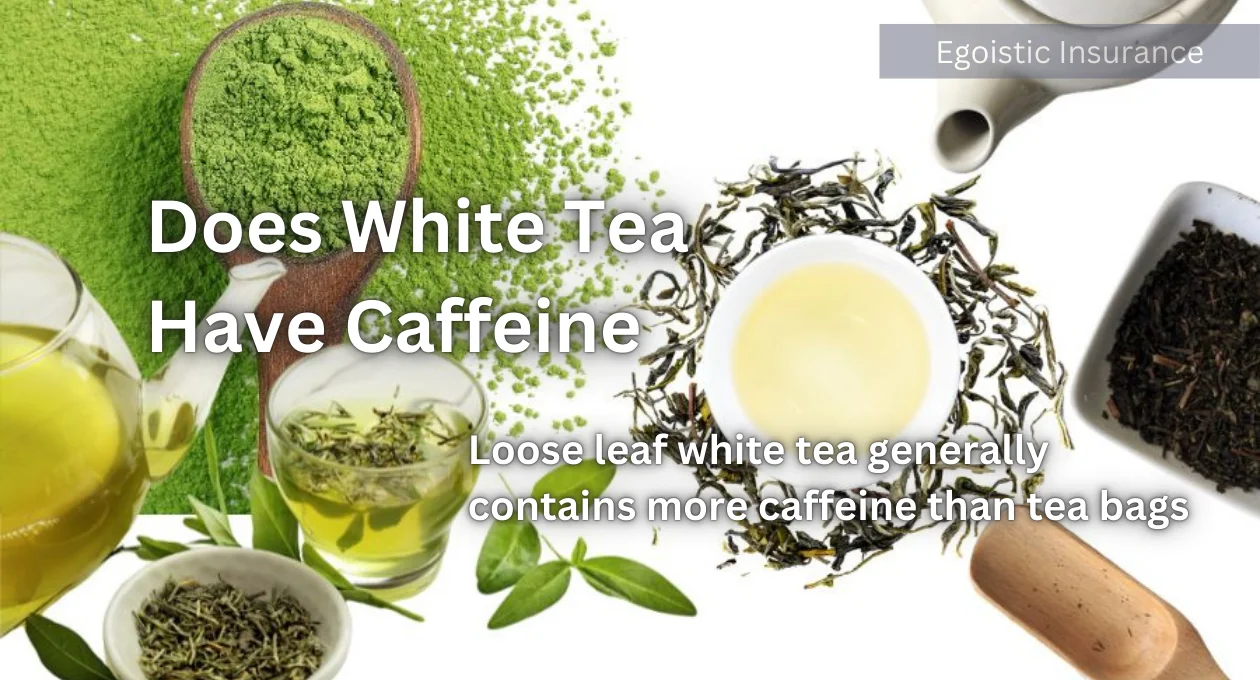Does White Tea Have Caffeine? white tea, a delicate and minimally processed tea, is often associated with subtle flavors and numerous health benefits. A common question among tea enthusiasts is whether white tea contains caffeine. The answer is yes, but the caffeine content in white tea is generally lower compared to other teas. However, the amount can vary based on several factors, such as the type of white tea, how it’s processed, and how it’s brewed.
The lower caffeine content in white tea makes it an appealing choice for those who are sensitive to caffeine or looking to reduce their intake. It allows consumers to enjoy a soothing cup without the jittery effects that higher caffeine levels can sometimes cause. Moreover, the natural compounds found in white tea, such as antioxidants, contribute to its health benefits. These properties can assist in promoting overall wellness while still providing a gentle lift.
Additionally, the brewing temperature and time can significantly influence the caffeine extraction from white tea. For those aiming for the least caffeine, using cooler water and a shorter steeping time is advisable. This method not only results in a lower caffeine level but also helps preserve the light, floral flavours characteristic of high-quality white tea. Ultimately, experimenting with different brewing techniques can lead to a personalised and enjoyable tea experience.
White Tea Caffeine Content
White tea naturally contains caffeine, though in lower amounts than black or green tea. On average, an 8-ounce cup of white tea contains between 15-30 milligrams of caffeine. This makes it a suitable option for those looking to reduce their caffeine intake without eliminating it entirely.
When considering the health benefits of white tea, it’s important to highlight its rich antioxidant properties. These antioxidants, like catechins and polyphenols, play a crucial role in combating oxidative stress and inflammation in the body. Regular consumption of white tea may help support heart health and improve skin condition, making it a thoughtful addition to a wellness routine. Additionally, its soothing properties can aid in relaxation, promoting mental clarity and reducing stress levels.
Another intriguing aspect of white tea is its versatility in pairings and brewing styles. Whether enjoyed hot or iced, it can be complemented with various natural flavors, such as lemon, mint, or honey. This adaptability allows tea lovers to experiment and find their preferred way to enjoy this delicate beverage. Furthermore, white tea can serve as an elegant base for blended drinks or cocktails, opening avenues for creativity in beverage preparation.
White Tea vs. Green Tea Caffeine
When comparing the caffeine content of white tea to green tea, white tea typically has less caffeine. Green tea contains around 30-50 milligrams of caffeine per 8-ounce cup, which is slightly higher than white tea. However, the difference in content can vary depending on factors like the tea leaves’ age, the growing environment, and how the tea is brewed.
In addition to its lower content, white tea is praised for its delicate flavour profile, which appeals to many palates. The light, floral notes are often accompanied by a subtle sweetness, making it a refreshing choice for any time of day. This gentle taste can be enhanced with minimal additions, allowing the natural characteristics of the tea to shine through. As such, white tea is an ideal beverage for those who appreciate a more nuanced tea experience.
Storing white tea properly is vital to maintaining its quality and flavour. It should be kept in an airtight container away from light and moisture to prevent spoilage. Ideal storage conditions help preserve the delicate aroma and taste, ensuring that each cup remains as enjoyable as the first. By paying attention to storage and brewing techniques, tea drinkers can fully appreciate the refined qualities of white tea over time.
Caffeine Levels in White Tea

The levels in white tea can vary depending on the type of white tea you choose. For instance, Silver Needle, a high-quality white tea, tends to have lower caffeine levels, while Bai Mu Dan (White Peony) might have slightly more due to its inclusion of leaves and buds. The brewing method also influences the content; longer steeping times and hotter water can extract more from the leaves.
When exploring the effects of white tea on hydration, it is important to note that it can serve as a gentle alternative to traditional caffeinated beverages. The combination of its lower caffeine content and high water volume means that drinking white tea contributes positively to daily hydration levels. This characteristic makes it an ideal choice for individuals looking to stay hydrated throughout the day while enjoying the soothing qualities of tea. Additionally, the light and refreshing taste can be particularly appealing during warm weather or after physical activity.
Another fascinating aspect of white tea is its cultural significance in various regions around the world. In China, where white tea originated, it is often associated with tradition and elegance, being served during special ceremonies and gatherings. This cultural element adds depth to the tea-drinking experience, as it encourages mindfulness and appreciation of the beverage’s delicate nature. For those who embrace the ritualistic side of tea drinking, incorporating white tea into their routine can enhance both social interactions and personal enjoyment.
Does White Tea Have More Caffeine Than Black Tea?
No, white tea does not have more caffeine than black tea. Black tea is typically higher in caffeine, with about 40-70 milligrams per 8-ounce cup. White tea, as mentioned earlier, contains only 15-30 milligrams. Therefore, if you’re looking to reduce your caffeine intake, white tea is a better option than black tea.
In addition to its flavour and health benefits, the preparation of white tea can become a mindful ritual for tea enthusiasts. Taking the time to select high-quality leaves, measure the correct water temperature, and steep for the right duration creates an experience that extends beyond mere consumption. This deliberate approach promotes a deeper appreciation for the subtleties of the tea and allows individuals to connect with the cultural history behind it. Ultimately, each cup of white tea becomes a moment of serenity, offering a brief respite in a busy day.
White Tea Caffeine vs. Coffee
When comparing white tea’s caffeine content to coffee, white tea is significantly lower. An 8-ounce cup of brewed coffee contains approximately 95 milligrams of caffeine, which is much higher than the 15-30 milligrams found in white tea. This makes white tea a good choice for those sensitive to caffeine or looking to reduce their overall.
Moreover, the delicate nature of white tea makes it an ideal beverage for various occasions, from quiet mornings to afternoon gatherings. Its subtle flavours can spark conversations and foster connections among tea lovers. As enthusiasts share their brewing techniques and preferred pairings, they cultivate a community built on appreciation for this exquisite drink. Ultimately, enjoying white tea together not only enhances the experience but also deepens one’s understanding of its rich cultural heritage.
Caffeine-Free White Tea Alternatives
For those seeking a caffeine-free alternative, there are herbal teas, such as chamomile, rooibos, or peppermint, which are naturally free of caffeine. These can be great substitutes if you enjoy the ritual of drinking tea without the stimulating effects of caffeine.
In addition to its unique taste and cultural significance, white tea is often celebrated for its potential health benefits. Rich in antioxidants, this tea may help combat oxidative stress in the body and support overall wellness. Regular consumption can be associated with improved skin health and boosted immune function, making it a great addition to a balanced lifestyle. As more people look for soothing beverages that also contribute to their health, white tea continues to gain popularity worldwide.
Low Caffeine White Tea
If you prefer white tea but are concerned about caffeine, consider selecting a low-caffeine variety. Silver Needle is known for its lower caffeine content, making it a good choice for those looking to minimize their intake. Additionally, brewing white tea at lower temperatures.
The enjoyment of white tea also extends to its versatility in culinary applications. Chefs and home cooks alike have begun to experiment with infusing dishes and desserts with the subtle flavours of white tea, enhancing everything from panna cotta to marinades. This creative use of white tea not only showcases its unique taste but also introduces a new layer of depth to familiar recipes. Incorporating white tea into the culinary realm invites a fusion of tradition and innovation, allowing enthusiasts to savour its delicate nuances in diverse forms.
White Tea and Caffeine Effects
The caffeine in white tea has a milder effect compared to coffee or black tea. While it can provide a gentle energy boost and enhance mental alertness, it is less likely to cause the jitters or anxiety that higher beverages might induce.
In addition to its role in hydration and health, white tea can also serve as a wonderful accompaniment to food. Its delicate flavor profile enhances various dishes, from light salads to seafood, allowing for a harmonious balance that elevates the dining experience. Pairing white tea with food not only highlights its nuanced taste but also invites exploration into how the tea’s characteristics interact with different culinary elements. This thoughtful combination can create memorable moments, whether during a casual meal or a formal gathering.
White Tea Caffeine Benefits

The moderate caffeine content in white tea can offer several benefits. It can improve focus and concentration, boost metabolism, and provide a gentle increase in energy without the crash associated with higher drinks. Additionally, white tea contains L-theanine, an amino acid that promotes relaxation and counters the stimulating effects of it.
White tea’s subtle flavour and health benefits make it a delightful choice for mindful consumption. Sipping a warm cup can serve as a moment of pause, allowing individuals to reflect and recharge amidst a busy lifestyle. The tea can be especially enjoyed during moments of solitude or shared with friends to foster deeper connections. As each cup is savoured, it encourages an appreciation for both the beverage itself and the rich traditions surrounding its enjoyment.
How Much Caffeine in White Tea?

The amount of caffeine in white tea can range from 15 to 30 milligrams per 8-ounce cup,depending on the type and brewing method. To reduce the content, you can use cooler water, steep the tea for a shorter time, or opt for a lower variety.
In addition to its many benefits, white tea presents a unique opportunity for exploration and experimentation. As enthusiasts delve deeper into the world of tea, they can discover various blends and flavours that complement white tea’s delicate nature. Pairing white tea with fruits, herbs, or spices can create intriguing infusions that elevate the drinking experience. This creative process not only broadens one’s palate but also invites endless possibilities in crafting personalized tea blends.
White Tea Decaf Options
While traditional white tea cannot be completely decaffeinated, some brands offer decaffeinated white tea, which has undergone a process to remove most of the caffeine. These decaf options typically contain very minimal caffeine, making them suitable for those who are highly sensitive to caffeine or wish to avoid it altogether.
The experience of enjoying white tea can be further enriched by mindful brewing practices. Taking the time to appreciate the aroma and colour of the leaves can enhance the connection to the tea itself. As you steep the leaves, consider how the temperature and duration affect the flavour profile, inviting a sense of curiosity and exploration. This ritualistic approach transforms tea drinking into a pleasurable ceremony, encouraging moments of reflection in our busy lives.
White Tea for Sensitive Caffeine Drinkers
For individuals who are sensitive to caffeine, white tea can be a gentle alternative. Its lower caffeine content makes it less likely to cause the side effects that higher caffeine beverages might, such as anxiety, restlessness, or sleep disturbances.
In addition to its health benefits and culinary versatility, white tea can also be enjoyed for its calming properties. The simple act of preparing and sipping a warm cup can create a serene moment, allowing individuals to unwind and detach from the stresses of daily life. Many find that this ritual not only soothes the mind but also enhances their overall well-being. Whether enjoyed alone or in the company of loved ones, white tea fosters a sense of connection and mindfulness that enriches the experience.
Caffeine in Loose Leaf White Tea

Loose leaf white tea generally contains more caffeine than tea bags because the whole leaves are used, which tend to have a higher concentration of caffeine. However, the caffeine content can still be lower than other types of tea. Loose leaf tea also allows for more control over brewing.
Beyond its delicate flavour, white tea is also celebrated for its rich antioxidants, which play a vital role in promoting health. These antioxidants, particularly catechins, help combat oxidative stress and may support overall wellness by reducing inflammation and boosting the immune system. Incorporating white tea into your daily routine can be a simple yet effective way to enhance your health while enjoying a refreshing beverage. Additionally, exploring various brewing methods can reveal the tea’s full character, encouraging a deeper appreciation for this exquisite drink.
FAQs
What is white tea?
White tea is a delicate tea made from the young leaves and buds of the Camellia sinensis plant. It undergoes minimal processing, allowing its natural flavours and health benefits to shine.
How does white tea compare to other types of tea?
White tea is generally higher in antioxidants and lower in caffeine compared to green and black teas. Its subtle flavour profile sets it apart, making it a preferred choice for those seeking a light and refreshing beverage.
Can I drink white tea if I’m sensitive to caffeine?
Yes, white tea is a suitable option for individuals sensitive to caffeine due to its lower caffeine content, making it less likely to cause anxiety or restlessness.
How should I brew white tea?
To brew white tea, use cooler water (around 160-185°F or 70-85°C) and steep the leaves for 3-5 minutes. Adjusting these parameters can help you achieve the desired flavour intensity.
Are there any health benefits associated with drinking white tea?
Yes, white tea is rich in antioxidants, which may help reduce inflammation, strengthen the immune system, and combat oxidative stress. Additionally, the moderate caffeine content may enhance focus and provide a gentle energy boost.
Can I drink white tea every day?
Absolutely! Drinking white tea daily can be a healthy addition to your routine, offering hydration and numerous health benefits, provided you enjoy it in moderation.
Conclusion
White tea does contain caffeine, though generally in lower amounts compared to other teas and coffee. Its gentle caffeine content, combined with its health benefits and delicate flavor, makes it an excellent choice for those who enjoy the ritual of tea drinking without the stronger effects of higher caffeine beverages.
Moreover, the versatility of white tea extends beyond just the brewing process; it can also be incorporated into various culinary creations. Use it as a base for refreshing iced teas, blend it into smoothies, or even infuse it into desserts like sorbets and cakes. The delicate flavors of white tea can complement fruits and herbs beautifully, providing an exquisite balance in both taste and presentation. Experimenting with white tea in the kitchen invites creativity while celebrating its natural qualities.
For more interesting information keep visiting egoisticinsurance.online


